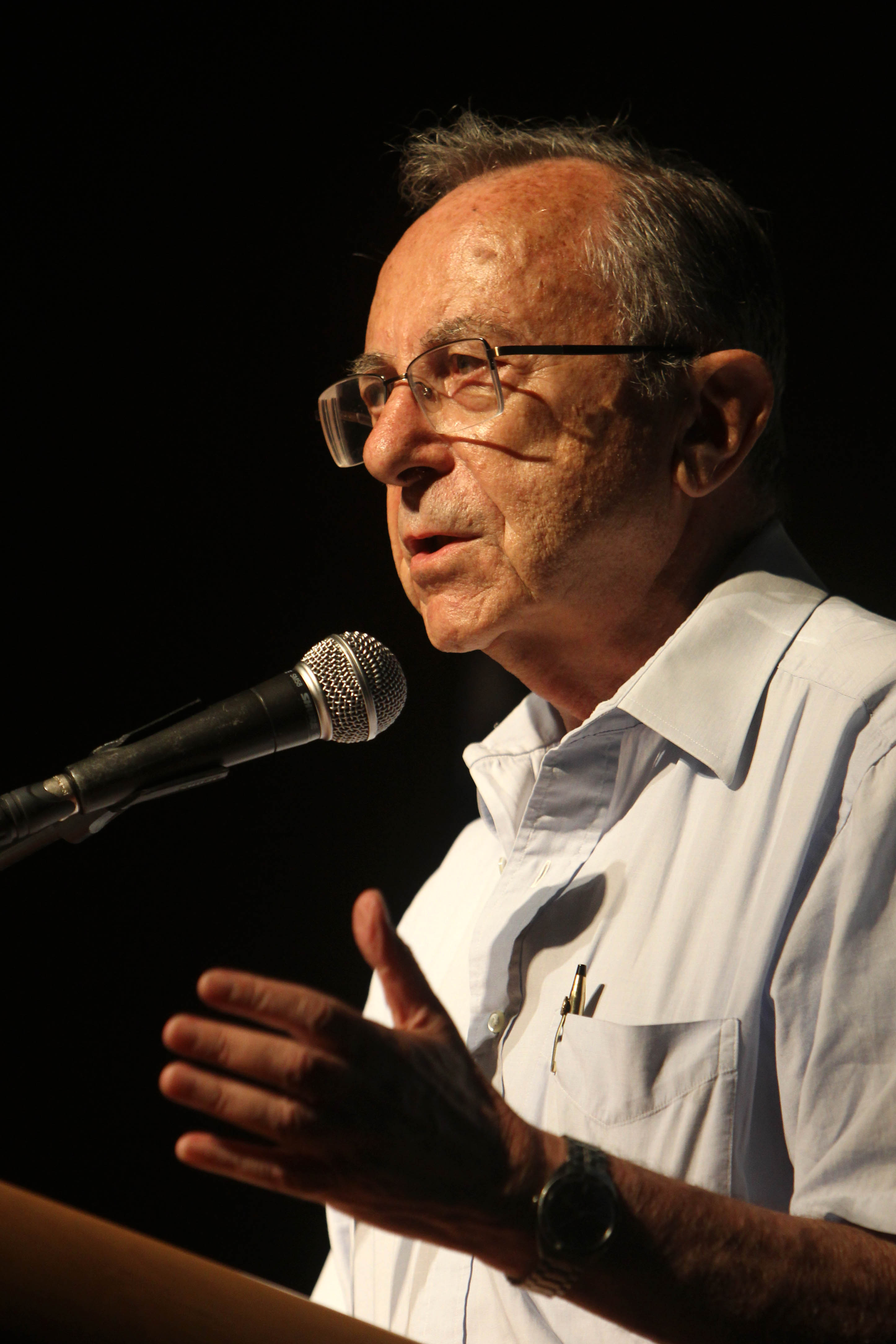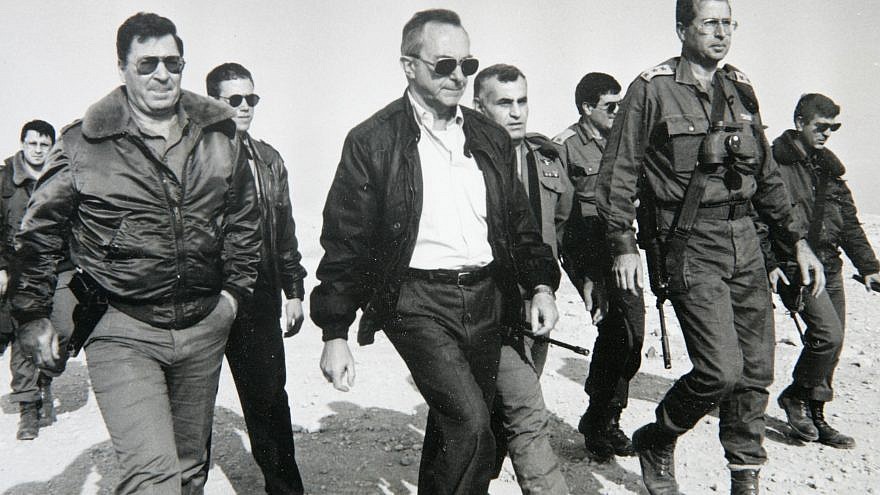Moshe Arens, the 1971 Israel Defense Prize winner, was an iconic figure in the creation of the military might of the Jewish state. But the journey there began on a tragic day in 1940.
Arens met his ideological mentor, Ze’ev Jabotinsky, only once and very briefly—on the last day of the life of the legendary Zionist leader. It was on Aug. 4, 1940, at Camp Betar in Neversink, N.Y. Arens was a 15-year-old immigrant from Riga, Latvia, who arrived on U.S. shores with his parents one year earlier, fleeing Europe before the start of World War II and the Holocaust.
Jabotinsky died of a heart attack later that night. The founder of the Jewish Legion had been banned by the British from pre-state Palestine, and his arrival to the camp was an inspiration to the young Betarim who viewed him as a visionary, traveling the world warning about the Nazi danger, and calling for the Jewish people to rise up and fight for their country before it was too late.

The young Arens became a leader in the Betar youth movement, and remained a loyal follower of Jabotinsky’s Revisionist movement and its ideology until his death on Jan. 7 at age 93. When he turned 18, Arens enlisted in the U.S. war effort, serving in the Army Corps of Engineers as a technical sergeant. Betar history buff Bobby Brown told JNS, “Before going to the army, Misha ran Betar in the critical years following the Holocaust and before the establishment of the state. It was all about helping survivors and contributing to the armed effort to make Israel free.”
In 1947, 22-year-old Arens moved to pre-state Israel and join the Irgun underground movement led by Jabotinsky disciple Menachem Begin. After Israel gained independence, Arens became a founding member of the Herut Party led by Begin, which had grown out of the Irgun and the Jabotinsky movement. Wanting to contribute to Israel in a meaningful way, Arens returned to the United States in 1951, preparing himself with training as an MIT- and Caltech-educated aeronautical engineer, earning a Ph.D. Back in Israel in 1957, Arens became a professor of aeronautics at the Technion-Israel Institute of Technology in Haifa until 1962. A visionary in potential Israeli air power, he became deputy director general at Israel Aircraft Industries in 1962, heading major development projects, including the Kfir fighter jet.
In 1971, Arens won the Israel Defense Prize.
Into the political fray
After Herut merged and became Likud, Arens entered the political arena at Begin’s behest and was elected to the Knesset in 1973. Four years later, Likud won the election, ending 29 years of the Labor political opposition. Begin became prime minister with Arens emerging as a central figure in the new governing party, becoming chairman of the foreign affairs and defense committee.
Standing by his beliefs, on Sept. 28, 1978, Arens voted against Begin on the issue of the Camp David Accords due to his opposition to withdrawal from the Sinai Peninsula. Begin came out victorious, yet despite their differences, he appointed Arens as Israeli ambassador to the United States and then as Minister of Defense.
Labour Party Knesset member Nachman Shai worked as the press officer for Arens in the Washington embassy. Shai told JNS, “Misha [as he was known] was so effective during the First Lebanon War in 1982. His understated and authoritative manner served him well as he developed a great relationship with political leaders and media giants of the day. He understood the importance of public diplomacy.”
Shai and Arens came from opposite sides of the political spectrum, but that didn’t take away from their relationship. “Misha was a special man, so different from other politicians,” said Shai. “He had chances to advance his own career and chose to pass, due to policy differences. Over the years, I consulted with him about my career moves. He always showed respect to my views and gave patient, sound quality advice and did so with kindness. Misha was a mentor, a friend and above all a ‘mensch.’ ”
Arens exhibited major disappointment over policy decisions to halt development of the Lavi fighter plane, as well as the decision not to retaliate for Iraqi rocket fire on Israeli targets during the 1991 Gulf War. He lost in a 1999 Likud leadership contest when he challenged his own protégé, Benjamin Netanyahu, for prime minister over policy issues. In 2003, at age 78, Arens retired from political life and focused his attention on writing major book projects and opinion pieces for Haaretz, while serving as chairman of the International Board of Governors of Ariel University in the West Bank.
In 2016, Nefesh B’Nefesh awarded him the Bonei Zion Prize.
Arens always made time for family—for his wife, Muriel (nee Eisenberg) and their four children.
Danny Krakow remembers “Uncle Misha,” his mother’s brother. Krakow told JNS, “He was a role model for me since I was a child. He was a loving uncle who showed interest in the well-being of each and every family member. I know that after the Holocaust, he tried and succeeded to find surviving family members. When I came on aliyah, he and his wife Muriel ‘figuratively’ adopted me, and he actually introduced me to my future wife, Shelly.”
Medad believes that Arens’ personal manner and behavior were in accordance with Jabotinsky’s teachings. “It’s called ‘Hadar.’ Misha commanded respect, but at the same time he had an approachable personality that astounded people. He embodied the essence of how Jabotinsky wanted Jews to behave.”
Brown said there was an important, lesser known side of Arens’ belief system. He told JNS, “While Betar is a right-wing movement, Arens also personified Jabotinsky’s liberal attitudes and beliefs in regard to the equal treatment of Arabs and other minorities in Israel. That’s what Jabotinsky and Arens were ultimately about. Liberal nationalism and mutual respect. It’s the opening words of the Betar anthem written by Jabotinsky, ‘From the pit of decay and dust, through blood and sweat a generation will arise, proud generous and fierce.’ Arens exemplified that generation.”


























